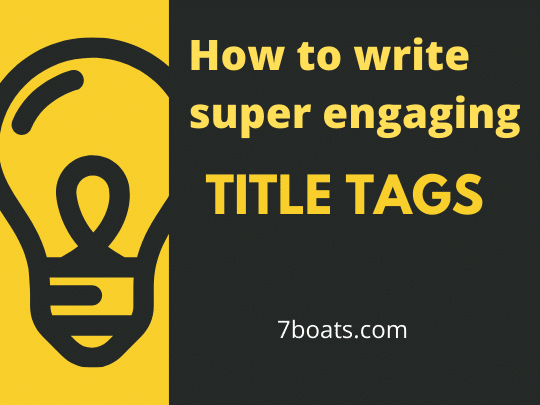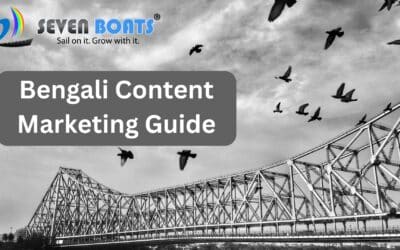
Learn how to write compelling & effective title tags for your web page or blog post that would get more clicks and better search engine ranking. The title tag, often written by content writers in a rush and with spite, is a key factor in SEO. Title tag optimization is the most important factor for on page SEO. Read here about top on-page SEO tricks. It is like the catch-line of an ad copy or the hook of a musical tune. It is what defines a web page to the search engine algorithm.
A lot of care must be invested in writing the title tags for web pages. In the traditional sense, a title tag used to be somewhere between 46 and 60 characters. Google’s experimentations with the search engine layout have pulled it down to a range between 48 and 62. Here you will get a SEO Title Tag Guide to write killer title tags. Get A to Z of writing the most effective and compelling titles for your web page or blog posts.
What is SEO title tag and how to write title tags effectively for better SEO ranking
The title tag is one of the most important elements of SEO. It tells search engines what your website is about and helps them determine whether or not to rank your site higher in the search results.
Writing effective title tags can be a challenge, but there are a few tips that can help you get started.
First, keep your title tags short and to the point. Longer title tags are often cut off by search engines, so including too much information can actually hurt your SEO.
Second, use keyword-rich phrases that accurately describe the content on your page. This will help search engines understand what your page is about and match it with the right searches.
Finally, don’t stuff your title tags with keywords. This can actually hurt your SEO by making your title tag seem spammy and unreadable. Stick to one or two relevant keywords and you’ll be on your way to writing title tags that effectively improve your SEO.
Video Tutorial on SEO Title Tags
3 Golden Rules of Writing Compelling Title Tags for better CTR
- The title tag of a web page must summarize the content of that page. This is the first golden rule of writing SEO title tags. Each web page is written with a particular theme or topic in mind. The information on that page pertains to a certain domain. The title tag must reflect that. It makes it easier for Google’s crawlers to index such web pages because they can quickly find out what the web page is all about and relate it to a user’s search. Title tags must contain the keywords that are used in the web content of that page in order to validate relevancy.
- The second golden rule of writing SEO title tags is that there must be a different page for information desired by the user. In other words, every user comes to the website with particular needs and requirements in mind. Some come to check the products and services, some for general information while others for offers and discounts. Each of these sections must have their own separate web page. That will make writing title tags a much easier job. There will be no conflict of interest in projecting ideas through a web page.
- The third golden rule of writing title tags is that you must not use one title tag for two web pages. Just like you would never think of duplicating the content of one web page on another, the same goes for title tags. Google’s crawlers must not find the same title tag on more than one page. It makes if difficult to index such pages and your website may be heavily penalized for putting up duplicate content.
The Salient Points of Writing Effective Title Tags
How to write title tags? We all know and wax eloquent about the importance of writing title tags. These title tags are the bedrock of SEO efforts to grab the top slots in SERPs. Despite knowing their importance, many SEO teams continue to flounder when up against the task of writing title tags.
Here are some pointers of writing title tags that will work for your SEO team and spell well for your online branding. Take a read:
Title tag Guide
Length Matters
The length of a title tag can be a vital component. Title tags usually last about 65 to 70 characters. In the background of latest developments in Google, it is expected from you to write tags that explain a page, even if they are somewhat lengthy in terms of SERP parameters. The latest page design of Google also makes it imperative for title tags to look 10 to 15% shorter. In other words, you have to think not just in terms of the number of characters but also about the space taken up by these characters.
Small is Sin
Why will you not make use of an opportunity that is there whether you take it up or not? There is a minimum length of characters while writing title tags that you must be concerned about. But it is usually something that should not be in your mind space. When you can write more characters, why settle for less? If the title tag is short, Google might add a few words to fill up the gap! Instead of allowing automated software to do that, use the specified title tag space to the fullest.
Well Begun is Half Done
Title tags must begin on a very powerful note. You cannot squander away an opportunity to make an impression on the reader or online user. It is not necessary that you use your primary keyword to start a title tag. What is important, however, that you use the title tag as a punch-line to knock out online readers! The first 25 characters in the title tag can make all the difference. If you can deliver something different, you have won the game in this chapter.
Title Tag Mistakes to Avoid
The title tags of a website are significant to its search ranking. In fact, the title tags show up as clickable links in search results, which in turn, help the website to gain traffic from the search results.
They also show up when you or someone shares your web pages on social media sites, and social media mentions are becoming a major ranking factor in search results, especially for Google. These tags are extremely important when it comes to SEO endeavors.
Title tags include the targeted keywords for your site and help the website show up higher in the search results for such words. Thus, optimizing the title tags are one of the most important task for any marketer.
However, many optimizers tend to do some common mistakes, when it comes to title tags. The following are some top mistakes that you need to avoid to stay ahead of the game and gain higher search ranks and entice more people to visit your site.
Don’t use your full domain name in title tag
This is a big no-no for a successful SEO endeavor. Use your title tags to show the potential visitors and the search engines what you offer – in other words, put your main keyword in the title tags. Your visitors can look at the URL tab to get the address of your site. Moreover, your web pages are likely to rank high if people search with your particular domain name. Thus, there is no need to include the domain name in the title tag; instead, use your targeted keyword.
Never put “Home Page” in your title
Though many website owners find it logical, including “Home” or “Home Page” in the title tag hardly helps visitors or search engines. In fact, such practices are just wasting valuable space, which could be otherwise used to share valuable information like what the page is about or what your offer.
Too long or too short title tags are bad
Using all your keywords or giving a brief description of your site in the title is useless. It will only make the title tag unnecessarily long. Why unnecessary? Because search engines will display only the first 70 characters of your title tag. Again, making it too short won’t help the purpose. You should use all the available space to tell search engines as well as the people about your website. The best solution is to create title tags with 70 characters (don’t exceed it) and remember to put the main keyword strategically.
No keyword in the title tag is bad
Title tags are created to tell the world what your website/ page is all about. And how could you tell people and search engines about your web page without including your keywords in the title?
Using too many keywords is a NO-No
This, again, is a malpractice that you should avoid. Using a long string of keywords in the title of a web page makes it look like spam. Many search engine optimizers use this trick to make the site rank well for those targeted keywords. However, users are less likely to click such sites as they are mostly considered as spamming.
Including the business name
Though it is tempting to use the business name as your home page’s title tag, try to stay away from this practice. It will hardly help in your SEO endeavor unless your business name includes at least 70 characters. Also, the business name should include some of the important keywords you are using to optimize the site. Business names that fail to include such important keywords will never serve the purpose of title tags.
They cannot tell people and search engines about what the website has to offers, especially to people who are not yet familiar with your business. And people hardly click on a search result that fails to give a clear view of the company.
For example, if you were searching online for a local car repairing company in Philadelphia, you are most likely to click on a search result that reads “Philadelphia car repairing service”, instead of a search result that just say a generic business name. In fact, sites that have their business name in title tags are less likely to rank higher in search results.
Fail to include geographic location
This is extremely important for local businesses that have physical retail locations. Such businesses are more likely to target customers from a specific region. Including the geographic location will make it clear to the search engines as well as to the searchers about your location i.e. your state, county, city or neighborhood.
Make the first few words eye-catching
Searchers, while scanning the search results, pay most attention only to the first few words and the first few results. Thus, make sure the first few words of your title tags are eye-catching as well as informative. They must be relevant to the search phrase. They key here is to include the most relevant keywords in the first few words. Also, make sure the content of your title tag is interesting enough to catch people’s attention.
Include Power Words , Sentiment & Numbers in Title
You can add a relevant power word to your title along with a positive or negative sentiment word and also a number. For example “7 powerful WordPress Plugins for better Performance“
Do not use ALL-CAPS in title. Use Sentence cases
Using sentence case in Title tag is always better.
However, never omit the important information like keyword and geographical location while trying to make the title eye-catching. Remember a good title tag not only helps to get higher search ranks, but also help you gain more targeted web traffics.
How to create SEO friendly optimized blog post title
How to optimize your SEO title tags for your blogs? Most of the traffic that gets generated for the blog is from the search engines. The need for creating search engine friendly content and more importantly, search engine friendly titles is increasing by the day.
By having a eye catching post titles that appeal well to the search engines, the viability of the post can be utilized to its maximum. Below are listed the tips that will help you get optimized blog post titles.
Use of effective keywords
Use of effective keywords in the title will make you work, an easier lot. Place the characters in the title in such a manner so that the keyword or keyword phrases get utilized in the most effective manner.
If you are able to place the keyword appropriately in the title at beginning, you will ensure the success of your endeavor and will be able to realize this opportunity to enhance your reach.
Keep the title simple
You need to keep the title as simple as possible. Keep the interest of the reader to be of paramount importance when opting for a title. No doubt, an attractive title will make for a great read, but you need to integrate the keywords in such a manner so that the essence of the title is not lost and it remains as simple as possible.
Use of descriptive post titles
Title is important as it gives a fair idea to the reader as to the relevance of the post. The reader gets a fair amount of idea about the topic that is to be covered in the post. Use creative keywords in the title and you can create a descriptive post title to make the implications clear to the reader. Take care to ensure that the title falls in the preview of word limits and is within the set limits of 75 characters.
Use power words, Positive Sentiment Words & numbers in post title
You should focus your attention to using trendy words in the post title. This will go a long way in building audience for your articles. Undoubtedly, people are looking for crisp content and if you are able to use trends words in the post title, you will get a step closer of realizing the objective of optimizing the post title and connecting with readers on a personal level.
Positive Sentiment Words
Power Words
Create questionable post titles or keep a positive or negative sentiment in your post titles
Readers connect with you in a better way when the title attracts them. The viable way of attracting readers is to post questionable post titles. Asking customers instead can be a better strategy and will go a long way in promoting your incentives.
Begin your post with a questionable post title as How and Why. The reader will be forced to think and will definitely like to go through your post to look for a solution to their concern.
Having a questionable post title is a valuable way of connecting with the readers and you can connect in a streamlined manner with readers.
Follow the above listed measures and you will go a step closer towards optimizing the blog post title.
How do I write a good title tag?
- Title Length between 40-60 characters including space.
- Keep it relevant & meaningful in relation to your page content.
- Keep focus keyword at beginning.
- Use a power word
- Use a positive or negative sentiment in title.
- Keep it in sentence cases.
- Keep it grammatically correct.
- Use – or | or , or : as title separators
- Don’t do keyword stuffing.
- Give every page a unique & meaningful title
- Take advantage of your brand by adding it at end (Optional)
- Write for your customers, not for search engines.
- Keep alternate title in open graph for your social posts (Optional)
How to write YouTube title & optimize YouTube SEO
Find below a few tips to write the most effective titles for your YouTube videos
- Conduct Keyword Research for your YouTube title tags.
- Use The Word “Video”.
- Consider Title Character Counts.
- Be Descriptive
- Rename your video file using a target keyword.
- Insert your keyword naturally in the video title.
- Optimize your video description.
- Tag your video with popular keywords that relate to your topic.
- Categorize your video.
- Upload a custom thumbnail image for your video’s result link.
- Comment on other relevant channels & videos
Quality Content & Relevant Titles: Secret to Win Outstanding Links
Link building is among the oldest of SEO tricks that work in favor of the site owner. This formula never goes wrong provided good quality links can be availed through engaging content and well-written titles.
Building Quality Links Depend on Quality of Content:
What do the terms like “Good content”, “Engaging content”, “Quality content”, actually mean? Sometimes, it becomes really difficult for site owners to decide how good a content should be to attain the level of “Quality content”.
It is a tad weird to expect everybody having the ability to create write-ups with optimum level of finesse and class. Nobody these days have enough time to waste on a poorly written blog with loads of mistakes.
The second and probably more important criteria for creating “Engaging content” is possessing an inkling of what is relevant and what is not. A plumber’s site might not make the visitor read everything about the history of plumbing, but there is no harm if they get a little bit of it in a nutshell.
The visitor can give it a thought of coming back to the site again, provided they get some DIY information in the site important specially when your basin gets choked in the midnight of a Saturday. Such tiny bits of information encased in a tete-a-tete mode make your site reliable and personal.
Title, Chosen with Care
As a web master you must always be thinking of saving some time on the complete process of attracting links from good quality websites. Then how can you expect your readers to waste time on the misguiding content of your web page without feeling cheated?
Try to create a title that barely explains what is there in the body of the write-up. If the title says, “Easy Soup Recipes to Cook in A Hurry”, the recipes that you write about should be easy enough to be cooked and had for breakfast before running to the bus stop to catch the bus to your office.
If your site is announcing a bouquet of offers and discounts, the page title should mention the most alluring of them all. A title like, “50% discount on winter garments” engage people more readily than a title like, “Discount Coupon Deals on Winter Garments”. Titles with numbers attract attention in fractions of a second.
Read more about how to engage users on your website , how to write compelling website content and how to increase website traffic.
Related Reading:









SEO title tag is the main thing standing between the Google’s SERPs and our website. If we can’t get people to click through, then we can’t get any website traffic.
Much needed articles.
Thanks!!
Thank you Arindam. Yes indeed. SEO title tag is the most important thing for search ranking and to attract traffic to your website. Many of my students ask me how do I write a good title tag? Some ground rules for SEO Title tags are –
1. Watch your title length.(Preferably 60 characters )
2. Don’t overdo SEO keywords. (Keep it meaningful, relevant & catchy matching to user’s intention)
Give every page a unique title.
3. Put important keywords first. (Meaningfully)
4. Take advantage of your brand. (You can add brand name at end of SEO title)
5. Write for your customers. (Don’t write for Google, write for your users)
On many sites I read about how to write seo-title correctly, but in many respects the situation remained not very clear to me. After reading your article, I received all the answers to the questions that interested me. Thank you, now I can use this information for my site.
Thank you Andy for your positive feedback.
Title tags remain an important part of SEO. In this context, you have clearly described with bullet points for writing compelling & effective title tags. I have read many articles about title tags but this is very informative, Besides you have added additional information in form of a PDF. Here you have written about Mistakes to Avoid. Some points I have found additional in your blogs are :
1. Don’t use your full domain name
2.Never put “Home Page” in your title
3.Try to stay away from including the business name
4. Do not use ALL-CAPS in the title. Use Sentence cases
Thanks!!
Thank you Sriparna for your comment.
Found some new approaches to writing SEO title tags. Really expanded my perspective of things.
Thank you. This will help me alot.
Thank you for your encouraging words
Your article explained everything to me and in a much better way than some other sites I check like Moz, Niel Patel. Extremely in-depth and informative article for someone who is starting to learn digital marketing. I will share these in my Facebook group, which has over 1000 people if you don’t mind.
That would be great Neha if you share. Thanks again.
thanks for this content it is really nice and helpful .
Effective title tags are a vital component of your SEO strategy. By optimizing your title tags, you can improve your website’s visibility, attract more organic traffic, and enhance user engagement.